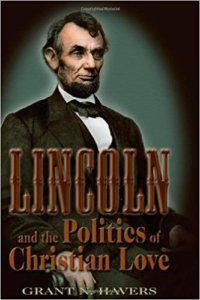More Lincoln; Less Political Debate

Lincoln and the Politics of Christian Love. Grant N. Havers. Columbia, MO: University of Missouri Press, 2009.
The central argument of Professor Havers’s new book is that a politics of Christian love, rightly understood, precludes American chosenness or exceptionalism. There can be no “democratic universalism,” Havers argues, apart from this ethic of charity. It becomes clear in the opening pages of the book that the author intends this argument to apply to current trends in American politics and foreign policy. He disagrees with those who think that America is exceptional or that universal assumptions can be made about natural rights, equality, or democracy without regarding important cultural (including religious) particulars.
These themes, Professor Havers argues, are related in important ways. He argues that America’s problem with the former (her sense of exceptionalism) has made her imprudent in advancing the latter (equality or democracy)–especially abroad. He believes America should not only be charitable and consider her own limitations but also determine whether her own successes are owed to a religious sensibility that other people have not yet acquired.
Professor Havers’ desire to attend to particulars rather than engaging in sweeping generalizations is commendable. But one must ask, was Lincoln really so insistent on the political precondition of Christian love? Havers obviously thinks so, but he doesn’t do enough to emphasize what Lincoln actually said on the subject. A search of Lincoln’s works, for example, doesn’t reveal Christian love or charity to be one of his consuming interests. So from the reader’s viewpoint it would have been helpful if Havers had done more to outline Lincoln’s most important statements on the subject.
Perhaps the author assumes his reader to be sufficiently knowledgeable about what Lincoln said and what he meant. But so much ink has been spilt about Lincoln–forming a kind of conventional wisdom–that a more precise, detailed, and explicit treatment would be in order here. Without that deeper treatment, one might easily think Lincoln to be only a stalking horse for Havers’ own arguments against other political theorists and not the dedicated center of the monograph.
Perhaps Professor Havers’s retort would be that he is responding to the use of Lincoln by colleagues for their own agendas. That much is certainly inferable from his responses to Harry Jaffa, George Anastaplo, or Joseph Fornieri, for example. The reader will have to decide for himself the merits of getting entangled in these debates.
The author devotes most of his book to engaging arguments from established figures such as Leo Strauss, Harry Jaffa, and Willmoore Kendall–not only on Lincoln but on subjects such as revelation or natural rights. (Voegelin is called upon as well.) The views Havers confronts become the launching point for his own argument. He devotes so much attention to revisiting prominent debates among political theorists over the last fifty years that this reader never felt engaged at length with the author’s own argument.
Perhaps Professor Havers thinks that his contribution is his reply to these luminaries on subjects he thinks pertinent to the subject of charity and politics. But to say something afresh, he would have to forcefully articulate something that can be clearly disentangled from what has already been said. This is the greatest disappointment of the book. One would like to see Havers break free from the pack more frequently and plant his own flag.
Professor Havers has certainly provided a useful introduction to the debates found within American political science during the 20th century. Scholars new to these debates will find all of this very helpful. Those who want a more penetrating insight into Lincoln, or who are otherwise disinclined to revisit familiar ground, will feel that they have signed on for a long literature review. Even when the author uses primary sources to compare against Lincoln, he is not always as effective as he might be. For example, is the best way to understand the originality of Lincoln’s religious rhetoric to contrast it with The Federalist? Might it not be more appropriate to contrast Lincoln’s speeches with previous presidential rhetoric?
The title of the book signals a noble ambition: applying themes of Christian love, as used by Abraham Lincoln, to political practice. Havers’s desire to inform political practice with social particulars and Christian virtue rather than sweeping and imprudent philosophical generalizations is a commendable conservative inclination. The book certainly has its virtues, and among them is its polemic against self-righteous and overly ambitious political thinking, but it will perhaps be more useful in helping the uninitiated explore important questions already considered rather than being an enduring study of Lincoln or his political religion.
An excerpt of the Lincoln and the Politics of Christian Love is available here; also see Grant Havers’ response here.




